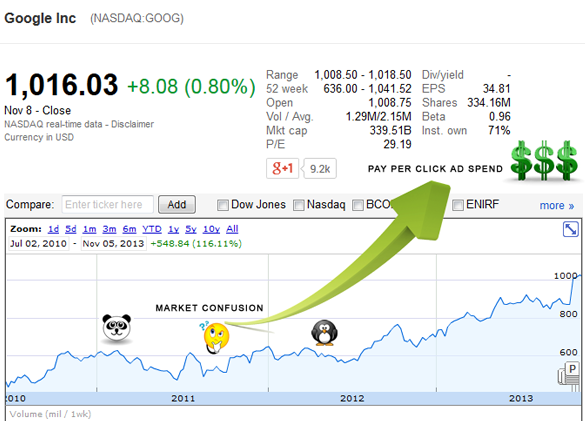Back in June, the distinguished engineer Matt Cutts came out swinging to debunk the fact that many webmasters, particularly those considered to be in the SEO (Search Engine Optimization) space, suggest that Google loves flux in its search results because it increases pay-per-click revenues for Google.
Cutts actually labeled this rumor a “Conspiracy Theory” noting that Google lost revenue when it first released Google Panda in February 2011.
So how would Google loose revenue after Panda and why would they shoot themselves in the foot?
Well, for a while there no one knew what they heck was going on. Google Panda was designed to take out content farms as well as MFA’s (Made for AdSense Sites), which it did, successfully; all those websites that were splattered with Google AdSense ads while having thin content (Demand Media for example) got tanked in search results.
This did cost Google money from reduced clicks on thousands of publisher sites, but this necessary evil turned into much larger rewards later on. And it’s not rocket-science. If the best nightclub in the entire world began requiring a cover-charge at the door; most patrons are going to pay to get in.
Google (GOOG) has been enjoying steady growth over the last couple of years since this continual algorithm updating stuff has become much more frequent. Google says it tweaks its search algorithm hundreds of times per year but releases few major algorithmic changes.
Google launched Penguin on April 24, 2012, and this is when the market really shook up. This time Google took out sites that were focusing too much on links and slapped on the Google Penguin penalty and starting sending “Death Messages” to site owners registered in Webmaster Tools. Penguin took things in a totally new direction making some sites impossible to appear for some if not all of the keywords they had purchased links for.

So with all of this confusion and calamity in algorithmic search, unpredictable results push businesses needing top rankings to spend more and more on “predictable clicks” [pay-per-click advertising], at least till things settle down. But settle down they won’t. Google has begun updating search results so frequently it’s getting hard to keep up – all while making it easier and easier to buy ads. Heck, Google even has customer service now for account holders looking to buy words – Adwords of course. So don’t expect it to slow down anytime soon, because revenues are on the upswing, climbing quicker than ever and the saying goes, if it aint broke don’t fix it.
BUT, I just want to add that I do feel these updates are necessary and that Google does need to keep people guessing in order for Google to remain the dominant player in search; but you have to admit that the changes, although good for search overall, because it leads, in most cases, to higher quality results, it does coincidentally increase revenue, which I guess, for Google, makes it a win-win.

About The Author: John Colascione is Chief Executive Officer of Internet Marketing Services Inc. He specializes in Website Monetization, is a Google AdWords Certified Professional, authored a ‘how to’ book called ”Mastering Your Website‘, and is a key player in several Internet related businesses through his search engine strategy brand Searchen Networks®

 *** Here Is A List Of Some Of The Best Domain Name Resources Available ***
*** Here Is A List Of Some Of The Best Domain Name Resources Available ***
Leave a Reply